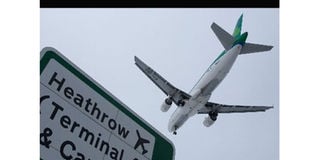UK to start mass deportation of Zimbabweans

150 undocumented Zimbabweans are to be deported from the UK on a private jet from Heathrow airport.
The United Kingdom will this week start the mass deportation of Zimbabweans, who sought asylum at the height of the country’s political upheavals under the late Robert Mugabe.
British envoys in Harare are said to have met Zimbabwe’s Foreign Affairs ministry officials to lay the ground for the imminent deportation of 150 Zimbabweans.
The first chartered plan with 50 deportees is expected in Harare on Wednesday, but there is a spirited campaign by some British legislators to block the deportations.
Seventy-five British politicians have written to Home secretary Priti Patel asking her to stop the deportations of the Zimbabwean nationals citing the “deteriorating” political and humanitarian situation in the southern African country.
The letter was signed by MPs and peers from all major British parties, who want the chartered flight to Harare on Wednesday to be “urgently halted.”
A notice from the British embassy in Harare revealed that a meeting with the Zimbabwean government officials on June 23 agreed that 100 people will be identified for deportation.
“We agreed that the embassy would share names with the ministry as they were gathered but that some of those indicated might actually travel,” reads part of the notice.
It said the flight would carry “foreign national offenders and (if capacity allowed) some immigration offenders.”
Lord Jonathan Oates, who co-chairs the All-Party Parliamentary Group for Zimbabwe, coordinated the lobby to halt the deportations.
The British politicians said it was clear from their engagements with Zimbabweans that the human rights situation has “continued to deteriorate in the country.”
“The Zimbabwean government is systemically oppressing its political opponents, denying freedom of speech and committing gross human rights violations,” reads part of the letter to Ms Patel.
“These violations include subjecting political opponents, including MPs, to illegal detention, sexual assault, torture and murder.”
Thousands of Zimbabweans were forced into exile from around 2000 when Mr Mugabe’s government embarked on an often-violent land reform programme that displaced nearly 4 000 white commercial farmers.
Most of them found refuge in South Africa, the UK, Canada, Australia and the United States.
After the 2017 coup that toppled Mr Mugabe, his successor President Emmerson Mnangagwa appealed to Zimbabweans to return home, but few took up the offer.
President Mnangagwa is accused on backtracking his promises to return Zimbabwe into a democracy amid a clampdown against his critics.
Zimbabwe’s economy is also still struggling, which has forced some of its citizens to seek refuge in neighbouring countries.





